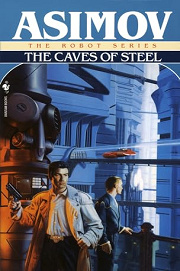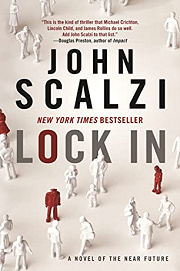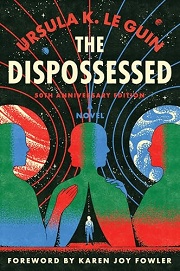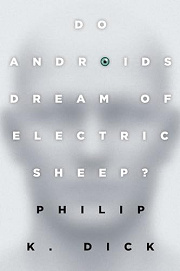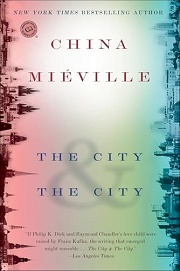Share your thoughts in a quick Shelf Talk!
The Caves Of Steel by Isaac Asimov
"A hardboiled detective and a hyper-rational robot are forced into an uneasy partnership to solve a murder that could upend fragile peace between Earth and the Spacer worlds. Sleek puzzles, social tension, and razor-sharp dialogue make The Caves of Steel a classic fusion of mystery and science fiction."
Have you read this book? Share what you liked (or didn’t), and we’ll use your answers to recommend your next favorite read!
Love The Caves Of Steel but not sure what to read next?
These picks are popular with readers who enjoyed this book. Complete a quick Shelf Talk to get recommendations made just for you! Warning: possible spoilers for The Caves Of Steel below.
In The Caves Of Steel, did you enjoy ...
... a near‑future whodunit where advanced tech reshapes crime-solving?
Lock In by John Scalzi
If the central puzzle of the murdered Spacer scientist in The Caves of Steel hooked you—and you enjoyed watching Elijah Baley pick apart clues alongside the hyper‑capable R. Daneel—then you’ll click with Lock In. FBI agent Chris Shane and their bulldog partner Vann unravel a killing that hinges on telepresence tech and neural networks, forcing them to question witnesses’ bodies and alibis much like Baley has to reframe evidence around robot capabilities and the Three Laws. It’s a crisp, tech‑savvy mystery with the same satisfying clue‑trail momentum you loved in Spacertown and the City corridors.
... a thoughtful, evolving human–robot partnership built on curiosity and trust?
A Psalm For The Wild Built by Becky Chambers
If what stayed with you was Baley and Daneel’s grudging partnership ripening into respect—across suspicion, riots, and City prejudice—this gentle novella scratches the same itch from a different angle. Tea monk Dex meets the robot Mosscap, and their rambling conversations echo Baley and Daneel’s best scenes: probing purpose, personhood, and what humans actually need beyond enclosed security. Where Baley learns to see beyond anti‑robot fear and Daneel’s literalism, Dex and Mosscap learn to truly listen. It’s quieter than chasing Enderby’s clues, but it delivers that warm click of a bond earned step by step.
... contrasting societies dissected through class, scarcity, and social conditioning?
The Dispossessed by Ursula K. Le Guin
If the stratified worlds of the enclosed Cities versus Spacertown fascinated you—the ration lines, status anxiety, and "Medievalist" backlash beneath the steel domes—Le Guin’s classic is a richer, deeper dive. Following physicist Shevek between an anarchist moon and a hierarchical planet, it examines how systems shape people as keenly as Asimov’s moving sidewalks and communal kitchens do. Like Baley’s case revealing how scarcity, fear of open spaces, and status drives a murder, The Dispossessed turns personal choices into a precise X‑ray of inequality and ambition.
... probing what makes someone a person when machines can pass for human?
Do Androids Dream of Electric Sheep? by Philip K. Dick
If Daneel’s uncanny humanity and the ethical knots of the Three Laws drew you in—especially the moments where Baley questions what empathy, duty, and personhood really mean—PKD’s novel goes straight for the jugular. Bounty hunter Rick Deckard tracks rogue androids that mimic humans almost as well as Daneel does, and every encounter tests the boundaries Baley kept prodding in interrogation rooms: can a programmed being have feelings, rights, or moral weight? It’s a tense pursuit layered with the same philosophical static that hummed through Spacertown’s labs.
... a mind-bending investigation where social rules shape what detectives can even perceive?
The City & The City by China Miéville
If you liked how Baley’s inquiry is constrained by the City’s taboos—agoraphobia, anti‑robot hysteria, and the political firewall around Spacertown—this novel makes those constraints the mystery. Inspector Borlú investigates a murder across two interwoven cities whose citizens must "unsee" each other, a cognitive discipline as rigid as the domed protocols Baley navigates. As with Enderby’s scheme hiding in plain sight, the solution demands grasping how society’s rules filter reality itself. It delivers that same gratifying click of insight, only with an even sharper intellectual edge.
Unlock your personalized book recommendations! Just take a quick Shelf Talk for The Caves Of Steel by Isaac Asimov. It’s only a few questions and takes less than a minute.
